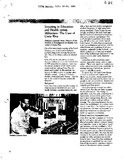Mostrar el registro sencillo del ítem
Investing in education and health versus militarism: the case of Costa Rica
| dc.creator | Mata Jiménez, Leonardo | |
| dc.date.accessioned | 2014-12-15T20:13:14Z | |
| dc.date.available | 2014-12-15T20:13:14Z | |
| dc.date.issued | 1984 | |
| dc.identifier.uri | https://hdl.handle.net/10669/11226 | |
| dc.description | objeto de conferencia -- Universidad de Costa Rica, Instituto de Investigaciones en Salud. 1984. Resumen de discurso de Leonardo Mata. | es_ES |
| dc.description.abstract | Costa Rica has a rather humble ancestry of tribal aborigines blended with poor and mostly illiterate colonizing Spaniards, and with a later and very modest immigration of other Europeans. A rural agricultural society developed. Costa Ricans became strongly attached to the land, built tight familial bonds and developed a democracy with active political participation. The small aboriginal population of not more than 50,000 at the rime of the Spanish Colonization, the difficulties encountered in setting a subsistence agriculture, and the unhealthiness and toughness of the environment — especially in the lowlands — precluded exploitation of men and establishment of big landholdings (latifundios) in the manner seen in other Latin American countries. Costa Rica is still considered a poor country, depending almost solely on agriculture. There is no significant exploitation of the subsoil and there is no knowledge of existing deposits of petroleum, precious stones or valuable minerals. For more than 150 years Costa Ricans insisted on a democratic system with alternation of power, and at present they elect, every four years and by direct vote, a president, two vice-presidents, deputies and local municipal authorities. Several parties compete and share power. Costa Rica has not invaded any other nation; Costa Rica has not been occupied by any other nation. The change of authorities every four years is followed by a replacement of most of the police forces and of their corresponding directors, who generally are civilians without military training. This interesting behavior has precluded the establishment of a military tradition in Costa Rica. The emphasis on peace and democracy has been accompanied by a significant investment in education and health as opposed to militarism. | es_ES |
| dc.description.sponsorship | Universidad de Costa Rica. | es_ES |
| dc.language.iso | en_US | es_ES |
| dc.publisher | IPPNW Report [International Physicians for Prevention of Nuclear War, Boston] Report 2(3):22 -25 | es_ES |
| dc.subject | Costa Rica | es_ES |
| dc.subject | Salud pública | es_ES |
| dc.subject | Políticas pública | es_ES |
| dc.title | Investing in education and health versus militarism: the case of Costa Rica | es_ES |
| dc.type | comunicación de congreso | |
| dc.description.procedence | UCR::Vicerrectoría de Investigación::Unidades de Investigación::Ciencias de la Salud::Instituto de Investigaciones en Salud (INISA) | es_ES |


